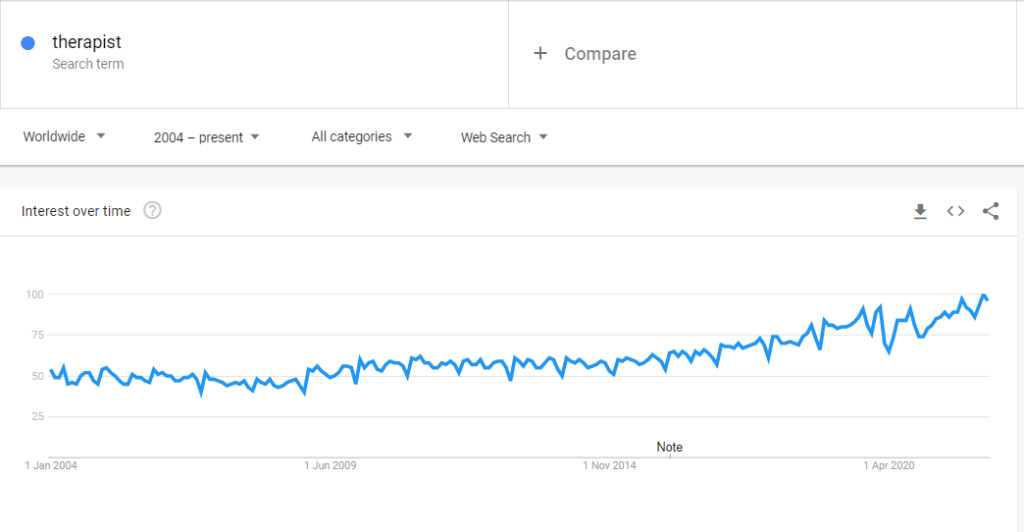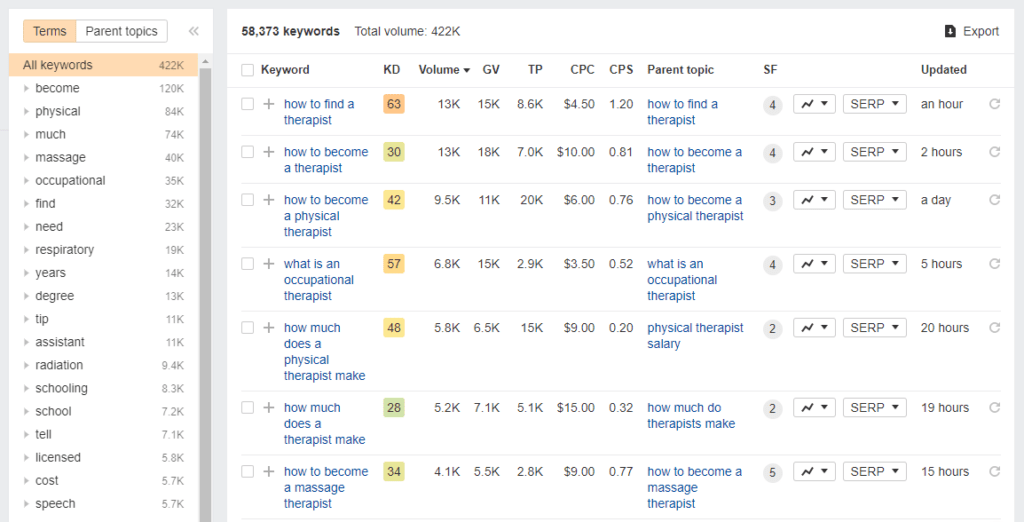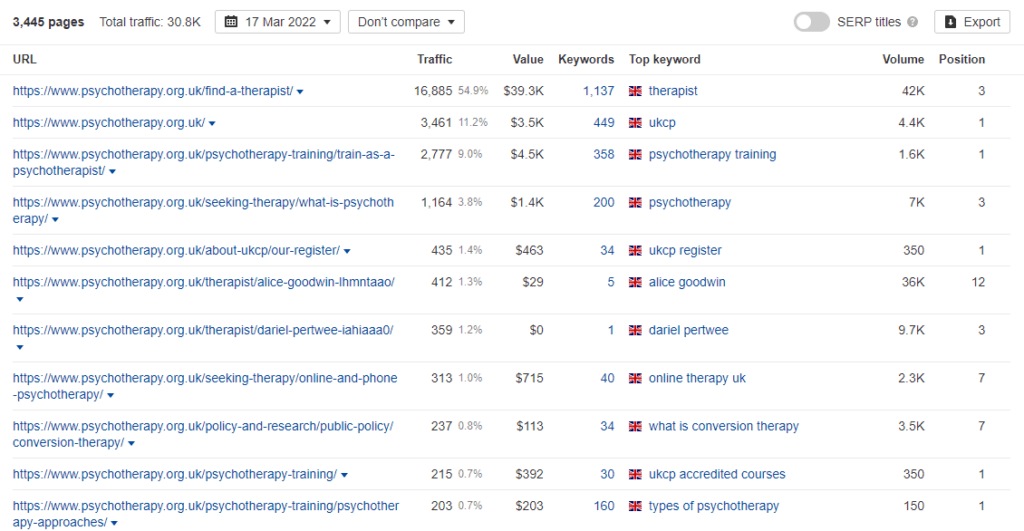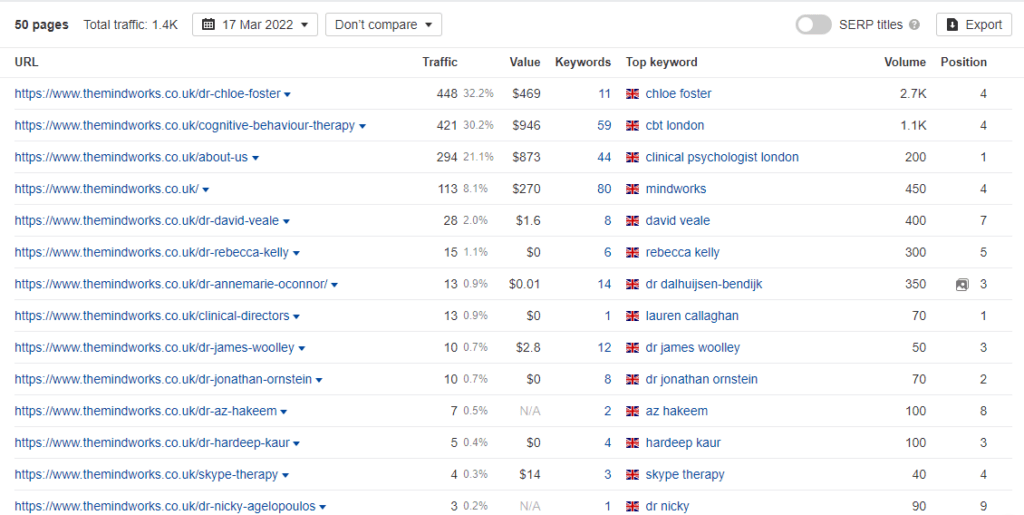If you run a therapy business, you will know that it is not all about providing first-rate care to your clients. While this is a critical part of the company, you also have to tackle numerous daily business challenges that come with building a successful therapy practice.
One of these challenges is getting new clients. In the past, many therapists found new patients through word of mouth. However, in today’s digital age, more people are using the internet to find healthcare professionals — therapists included. This shift has made SEO for therapists a key part of growing a modern practice.
There are several ways a therapist — or any business owner — can attract people to their website. Popular methods include pay-per-click (PPC) advertising, social media marketing, and search engine optimisation (SEO). Each approach has its pros and cons. Social media marketing and PPC offer immediate results by driving visitors to your site as soon as the campaign launches.

However, they can become expensive over time and stop delivering traffic as soon as the ad spend ends. In contrast, SEO for therapists generally takes longer to show results, but the impact is more sustainable. Once your website ranks well in search results, it can continue attracting visitors even if you pause your optimisation efforts. This makes SEO for therapists a more cost-effective long-term strategy for client acquisition.
Ultimately, investing in SEO is a smarter long-term move than continually spending on ads. It also builds more trust — people tend to see websites found through organic search as more credible than paid advertisements.SEO expert Cyrus Shepard also makes a strong point in his famous quote:
“The beauty of SEO is that, instead of pushing a marketing message onto folks who don’t want to hear what you have to say, you can reverse-engineer the process to discover exactly what people are looking for, create the right content for it, and appear before them at exactly the moment they are looking for it. It’s pull vs push.” – Cyrus Shepard, Founder at Zyppy
But the key question is, can therapists actually attract new customers to their businesses and websites by using SEO? Categorically, the answer is yes! Let’s now look at how successful your business can be if you employ an effective SEO strategy.
Why SEO Is Especially Crucial for Therapists
The mental health field is built on trust, privacy, and human connection, yet the first touchpoint for many clients is a simple Google search. Whether they’re experiencing anxiety, seeking couples therapy, or looking for a local CBT specialist, prospective clients often start with a search engine.
This is where SEO for therapists becomes critical. SEO ensures that when someone searches for help, your website is visible, accessible, and positioned as a credible resource.
Unlike flashy ads or sponsored posts, SEO feels organic and authentic. When clients find you in search results, it implies relevance, authority, and trust. In a field where personal comfort and credibility are paramount, this makes a world of difference.
Search Demand for Therapists on Google

The screenshot above shows Google search data on the term ‘therapist’. As we can see, worldwide, people search for the word therapist on average 435 thousand times per month. An estimated 259 thousand of these searches are in the United States, 44 thousand in the United Kingdom, and 17 thousand in Australia. This demonstrates that there is a considerable number of people looking for therapy services daily in your country. Consequently, SEO for therapists can help you draw in tens of thousands of visitors to your website each month.

And here, we can see that Google Trends displays a similar picture. The above screenshot demonstrates evident growth in the popularity of the search term ‘therapist’ from 2004 until the present day. This means that more and more people are looking for therapist services online every year. As a result, if you decide to hire an SEO company to promote your therapist website in search results, you will be in fantastic stead to keep getting an increasingly high return on investments (ROIs) for years to come, particularly as social media ads and PPC become more costly and competitive.
People Use Lots of Search Terms to Find Therapists
It is important to note that ‘therapist’ is only one possible keyword and that there are many other terms people might use when searching for therapy services. One critical part of SEO is keyword research, where experts examine search queries and substantiate which pages need to be created on the website and optimised for keyword usage to attract maximum traffic. Here is just a short selection of examples of search queries that people enter on Google when looking for therapy services:
- ‘Therapist near me’
- ‘Therapist in…’ + location. For example, ‘therapist Manchester’.
- Searches for particular types of therapists, such as ‘physical therapist’, ‘massage therapist’, ‘counselling’, and ‘respiratory therapist’.
- ‘Therapist for…’ + issue, such as ‘mental health therapist’ and ‘sexual therapist’.
Below, the screenshots show the average monthly search volume for a range of therapist-related keywords. As you can see, there are millions of people searching for these keywords every month, meaning that a great SEO-optimised therapy website can attract thousands of free visitors every month purely by showing up for these keywords on the search engine Google.


How On-Page SEO Impacts Therapy Websites
On-page SEO refers to the optimisation of elements on your website that influence your rankings. For therapists, this includes:
- Page Titles & Meta Descriptions: These are the first things a user sees in search results. Titles like “Experienced CBT Therapist in London | Book a Free Consultation” can improve click-through rates.
- Header Tags (H1, H2, etc.): Proper formatting helps Google understand your content structure and improves readability.
- Internal Linking: Linking between blog posts and service pages helps search engines crawl your site more effectively.
- Optimised Images: Compressing images and using descriptive file names (e.g. “child-therapy-session.jpg”) helps with SEO and site speed.
When done right, on-page SEO not only boosts your search rankings but enhances user experience—keeping visitors on your site longer and increasing conversions.
Other Therapists are Already Getting Results from SEO
Effective SEO can bring excellent results, helping websites appear higher in search results and potentially saving website owners thousands of dollars on advertising every month. But, instead of just reading about it, let’s show you. Below, we consider several examples of therapist websites witnessing a great return from their SEO efforts.

Our first example is www.psychotherapy.org.uk, an aggregator website that gives information about therapists working within the UK. This website has 30.9 thousand average monthly visitors. These are people who visit the website after seeing it pop up in Google search results.
Meanwhile, the website’s average monthly traffic value is roughly $53,200. This amount shows how much money the website owner would need to spend every month to purchase an identical amount of traffic they get organically from contextual advertising systems, such as PPC ads. As a result, this means that the website’s owner can save over $53,000 per month because their website enjoys fantastic positioning in Google’s search results.
The screenshot below shows which pages bring the most traffic for this website:

As we can see, the pages in the list above draw impressive traffic from a selection of pages. An excellent SEO expert can analyse the pages currently on both your website and competitor websites, optimise existing pages to help attract even more people, and create new pages that will collect as much organic search traffic as possible. Of course, this is only one aspect of SEO work, and there is a range of other things that SEO agencies do in order to promote websites.
You might be thinking that it is hardly unusual to see impressive results with a big therapist aggregator website, but what about a smaller, more humble website? Is SEO still a worthwhile investment? Our screenshot below will clearly demonstrate that it definitely is.

Clearly, even for a smaller website, the results look encouraging. This London based therapy business illustrates a far more modest example than the aggregator website mentioned above. The Mind Works attracts roughly 1.4 thousand organic website visitors each month and has a traffic value of about $2,500. This website ranks highly on Google for the search term ‘therapist practice London’ and numerous other keywords and attracts desirable traffic. This website gets $2,500 worth of free traffic from Google, meaning that they can save this money that would have been spent on PPC ads.
The main factor to keep in mind is that PPC ads consist of buying traffic in exchange for money. So it makes sense that as soon as you cease paying for these ads, the traffic stops. But, with SEO, you will keep your search positions and keep getting traffic even if you decide to no longer use SEO services. By hiring a qualified SEO agency and boosting your website’s rankings on Google, you can conserve money and keep your website’s traffic without the need to spend money on advertising channels such as PPC.
Let’s now consider the pages bringing the majority of visitors to this website:

Some keywords that bring the most traffic to these pages include ‘cbt london’, ‘clinical psychologist london’ and names of various therapists such as ‘chloe foster’. This again shows that there is a significant variety of keywords that your website can utilise to gain free traffic on Google. A great SEO agency can create, optimise, and promote those pages effectively, bringing more business to your company.
Technical SEO for Therapists: What You Might Be Missing
While content and keywords are important, technical SEO ensures your website functions properly for search engines. Here’s what therapists often overlook:
- Mobile Responsiveness: A huge chunk of therapy searches come from mobile. If your site isn’t mobile-friendly, you’re losing leads.
- Fast Load Speeds: Page speed is a Google ranking factor. Sluggish sites cause visitors to bounce.
- SSL Certification (HTTPS): Google prioritises secure websites, especially in sensitive fields like mental health.
- XML Sitemap and Robots.txt: These files help search engines index your content efficiently.
Even if you have great content, technical SEO issues can quietly drag down your visibility. NUOPTIMA audits and optimises all of this in our comprehensive SEO strategy.
Local SEO for Therapists
Local SEO techniques are used to make sure that a website is displayed to people who search for certain services locally. For example, if you were to enter ‘therapist near me’ on Google, you will find websites run by therapists in your local area. Therefore local SEO is critical for businesses offering services in-person, such as therapy. But, just adding your website to Google My Business and adding your location on Google Maps will fail to bring as much traffic as you might like. Only comprehensive search engine optimisation of websites can actually lead to tangible results and assist your website in rising in search engine rankings.
Blogging for Therapists: Building Authority and Trust
Blogging is a powerful SEO strategy for therapists. It allows you to target long-tail keywords, demonstrate expertise, and build trust with potential clients. Consider topics like:
- “What to Expect During Your First Therapy Session”
- “Signs You Might Benefit from Couples Counselling”
- “CBT vs DBT: What’s the Difference?”
These posts not only attract organic traffic but also help prospective clients feel informed and confident in reaching out to you. NUOPTIMA’s SEO team can plan and write blogs tailored to your practice and audience.
Our Predictions for SEO Into The Future
As search engines evolve, so do the strategies needed to stay visible. The SEO landscape is becoming more sophisticated, with search engines placing increasing emphasis on user experience, expertise, and relevance. For therapists, this shift presents both challenges and opportunities.
1. More Focus on Expertise and Trust (E-E-A-T)
Google is doubling down on Experience, Expertise, Authoritativeness, and Trustworthiness — especially for websites related to health and wellness. Therapists will need to demonstrate clear credentials, publish high-quality educational content, and secure backlinks from credible sources to maintain strong rankings.
2. Voice Search Will Change How Clients Find You
As voice assistants become more popular, search queries are becoming more conversational. Instead of typing “CBT therapist London,” users might ask, “Who is the best CBT therapist near me?” This means content must be optimized for natural language and question-based queries.
3. Local SEO Will Become Even More Competitive
With more therapists investing in digital marketing, standing out in local searches will require more than just claiming your Google Business Profile. Ongoing content creation, reputation management (reviews), and consistent NAP (Name, Address, Phone) details across platforms will be crucial.
4. User Experience Will Be Non-Negotiable
Search engines are increasingly factoring in how users interact with your website. Fast load times, mobile-first design, clear navigation, and accessible content are no longer optional — they directly influence your visibility.
5. AI Will Influence How Content Is Ranked and Written
AI is changing how Google understands content. Pages that answer specific client needs and demonstrate psychological insight — not just keyword stuffing — will perform better. Therapists who produce empathetic, well-structured, and helpful content will have an edge.
What This Means for Therapists:
To stay ahead, therapists should treat SEO not as a one-time setup, but as an ongoing strategy. Regularly updating your content, staying compliant with SEO best practices, and adapting to algorithm changes will be essential for attracting new clients in the years to come.
What Does an SEO Company Do?
While SEO is a prudent investment for therapists, achieving outstanding results takes much expertise, hard work, and skill. This is particularly true for websites that operate in the health and wellness fields. Google sets very high standards for websites selling products, providing services, or having content related to health and wellness to stop low-quality websites from attaining the top positions in search results.
But, NUOPTIMA has been working with brands in a range of fields, including the health and wellness industry, for numerous years. Our experts have bundles of experience doing SEO for medical providers, clinics, companies selling supplements, and more! We, therefore, know precisely what to do to get your website to appear on the first page of Google. Here are just a handful of things we can do to help improve your therapist website’s Google rankings:
- Arrange the placement of links on reputable medical and health and wellness websites.
- Create SEO-optimised content to help your website rank for more keywords on Google.
- Optimise existing pages to comply with the rules and best practices of Google.
- Create all the relevant pages to help your website gain as much organic traffic as possible.
Effective search engine optimisation can provide outstanding results if done correctly by qualified professionals. At NUOPTIMA, we have a large SEO team packed with a lot of expertise that can truly assist your website in achieving desirable results. Book a free discovery call today to uncover how we can use SEO to achieve great results for your business and website.
Strengthen Your Online Reach with Nuoptima
In the competitive landscape of therapy services, a strong online presence is a must. With the right SEO strategies, your practice can enhance its visibility, attract more potential clients, and establish itself as a leader in the industry.
At Nuoptima, we specialize in SEO for therapists. Our team of SEO experts understands the unique challenges and opportunities in this industry. We use proven strategies and innovative techniques to help our clients improve their search engine rankings, drive more traffic to their websites, and grow their businesses. Contact us today to learn more about how we can help your therapy practice thrive in the digital landscape.
FAQ
SEO helps therapists attract new clients by increasing their visibility in search engine results. Since many people now search online for healthcare providers, ranking well in Google can lead to a steady stream of potential clients.
Paid ads can deliver immediate traffic but stop as soon as the budget runs out. SEO takes longer to show results but is more sustainable and cost-effective over time, making it a better long-term investment.
Users search for terms like “therapist near me,” “CBT therapist in [city],” or “couples counselling.” SEO involves researching and targeting these keywords to ensure your website appears in relevant searches.
On-page SEO includes optimizing titles, meta descriptions, headers, internal links, and images. These elements help search engines understand your site and improve user experience, both of which boost rankings.
Yes. Even smaller websites can attract valuable traffic through targeted SEO. Examples in the article show that well-optimized local therapy websites receive thousands of dollars’ worth of organic traffic each month.
Important areas include mobile responsiveness, fast load times, secure HTTPS setup, and properly configured sitemaps. These affect both user experience and how well search engines index your site.
Local SEO ensures your practice shows up when people search for therapists in your area. It goes beyond Google Maps listings and involves optimizing content and site structure for local search terms.
Blogging helps you rank for specific, long-tail keywords while establishing your authority. Posts answering common client questions can attract traffic and build trust with prospective patients.



